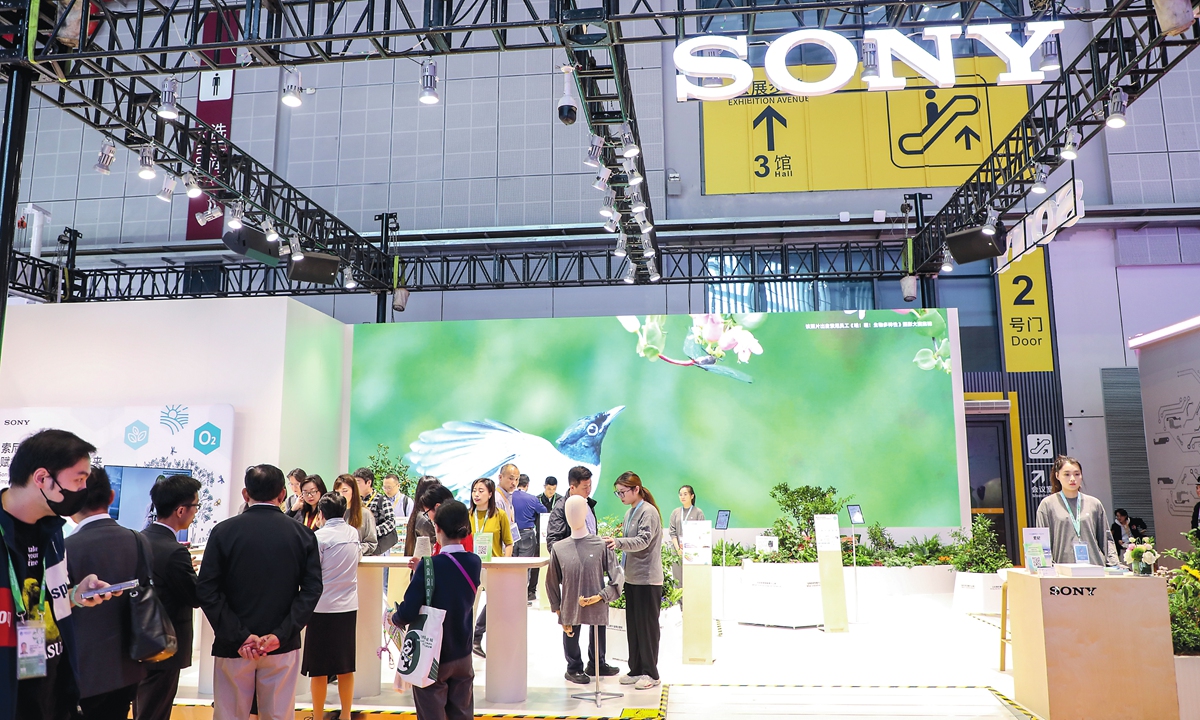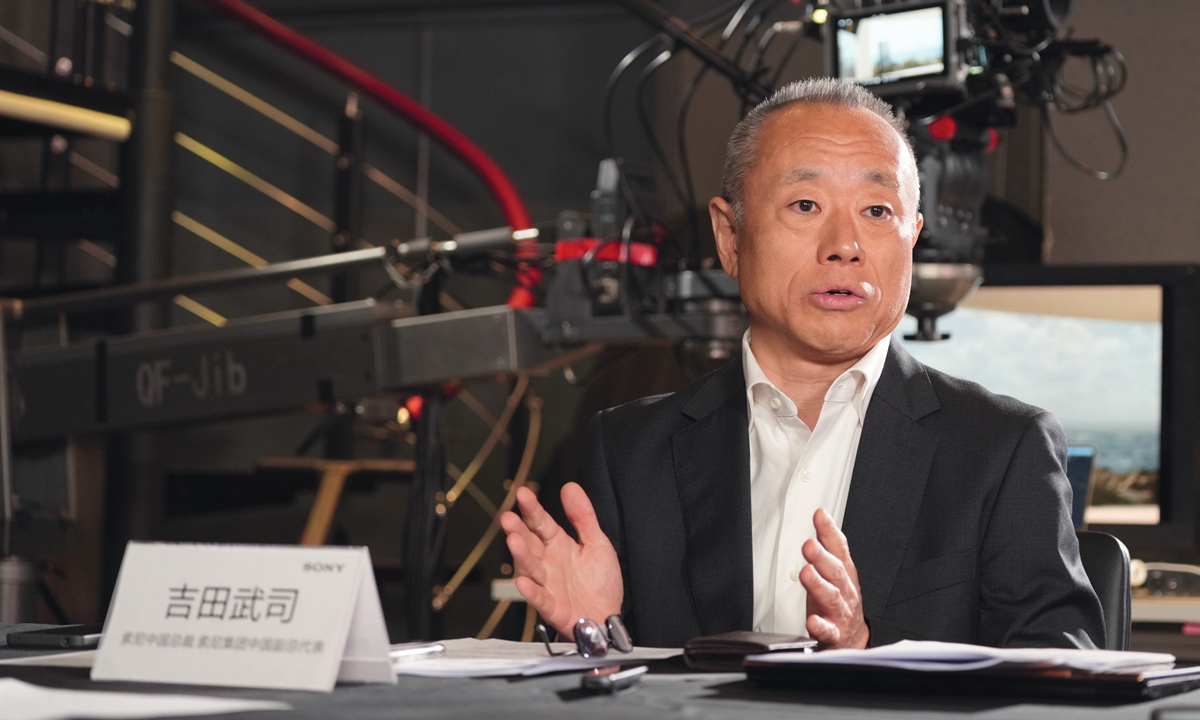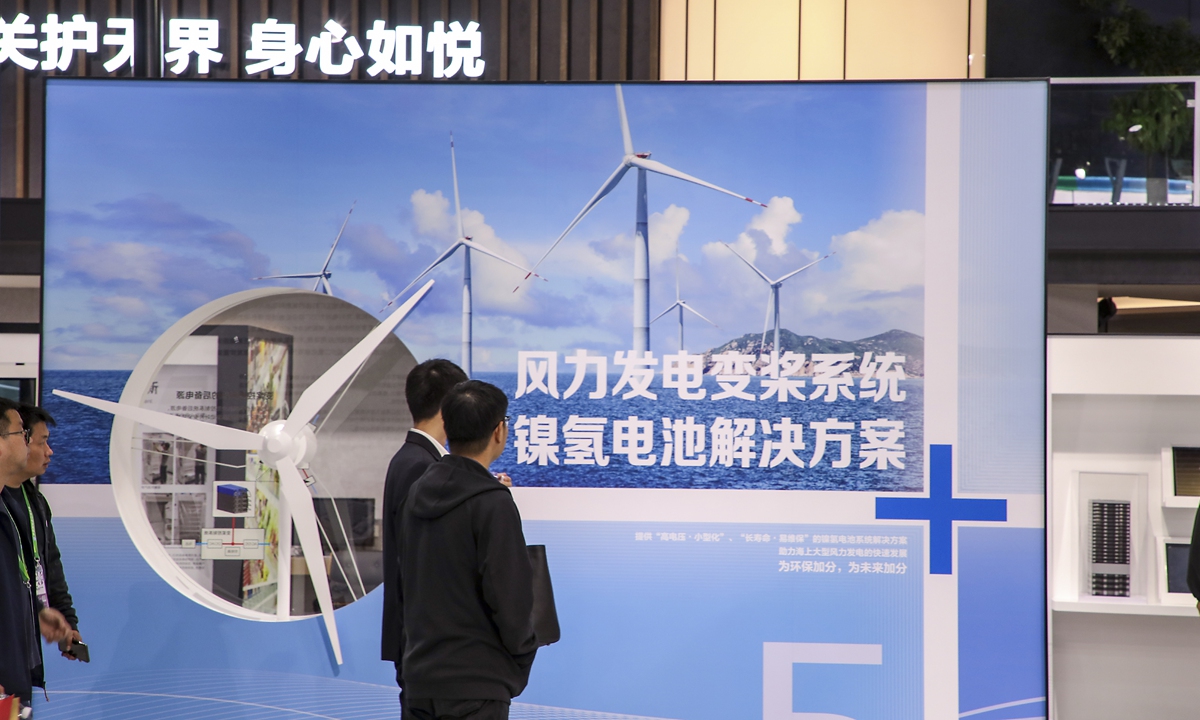China’s vitality gives multinational companies new inspiration and vitality: President of Sony (China)

Visitors at a booth of Sony during the 6th China International Import Expo in Shanghai on November 8, 2023 Photo: VCG
The joint declaration of the 9th China-Japan-ROK Trilateral Summit Meeting stated that the joint efforts of the three countries in the economic and trade field play an important role in the prosperity and stability of the regional and global economies. Business leaders from Japan and South Korea in China said that they attach increasing importance to the Chinese market and anticipate the meeting will inject new impetus into future cooperation among the three countries.
The latest survey results released by the Japanese Chamber Commerce and Industry in China (CJCCI) showed that 56 percent of Japanese companies in China said they would maintain or increase investment in 2024, an increase from the previous survey. Takeshi Yoshida (Yoshida), president of Sony (China) Ltd and Sony Group deputy China representative, recently said in an exclusive interview with Global Times (GT) reporters Tu Lei and Xing Xiaojing that as a member of the CJCCI, Sony has confidence in the Chinese market.
As Sony is one of the first foreign-funded companies to enter China at the initial stages of China's reform and opening-up,Sony is no stranger to Chinese consumers. At the booth of Academy of Imaging Technology in Beijing where the interview took place, GT reporters saw the "Walkman" and "CD record player" and other products with the "mark of the times," which were very popular decades ago in China. However, today's Chinese consumers may still perceive the Sony brand as being more about electronics, but are unaware of its shift and effort to position itself as a creative entertainment company.
To change this perception, Yoshida, who made a special trip from Shanghai to Beijing for the interview, stated that more effort must be made to help Chinese consumers re-understand Sony. He also said that if Sony is like a "dream machine," the Chinese young people who dare to "dream" boldly have inspired Sony to have the courage to "dream" and use technology to "make dreams come true." China's vitality has provided new inspiration and growth to multinational companies including Sony, and there is still a considerable number of potential business opportunities available in the Chinese market in the future, he said.
From "Made in China" to "Created in China"
GT: Sony has been conducting business in China since 1978 and has set up offices in cities including Beijing, Shanghai and Guangzhou. In the wave of more than 40 years of reform and opening-up, how has your company adapted to the changes in the Chinese market?
Yoshida: As early as in 1975, Deng Xiaoping, the late Chinese leader widely regarded as the "Chief Architect of China's reform and opening-up," met with Akio Morita, one of the founders of Sony, establishing the relationship between Sony and China. In the early days of reform and opening-up, home appliances and radio and television products that Sony produced began to enter the Chinese market. At that time, home appliances were some of Sony's major products, so it also regarded China as its main production base, and successively set up factories in Beijing, Shanghai, Wuxi in East China's Jiangsu Province and other locations.
With the rapid development of China's economy in the 21st century, we have realized that China will no longer be a pure production base. Competition in the Chinese market is becoming increasingly fierce. In the 1980s and 1990s, products developed and manufactured in Japan and the US were delivered directly to China, and sales were usually good, but this good time has gone forever. We must design and manufacture products that are more in line with the needs and preferences of local consumers, otherwise the future will be worrying.
At the same time, China is gradually transitioning into a base with advanced production technology, design and research and development (R&D) conditions. Our technology, products and services need to be tested in the Chinese market. This is also a big change. Keeping up with China's development speed is an important issue we have to face.
GT: Has this issue continued to this day?
Yoshida: Yes, we have been trying our best to catch up with China's speed. China's development is changing rapidly. For management, how to catch up with China's speed has always been a major issue related to the success of the company. Before coming to China, I was based in the US. In my daily life, I can personally feel that the changes in China are as fast as those in the US. In particular, the popularity of smartphones has put China ahead of the US in the digital field, which requires us to think, adjust, and adapt to changes day-by-day.
GT: Looking back at the early 21st century, many young Chinese were eager to own a Sony "Walkman," but now young consumers are not as eager for Sony products as they were then. How do you view this change?
Yoshida: Sony is a company that creates new products and new technologies and has developed based on them. What makes people grateful is that many young Chinese still know the brand "Sony" and can also list cameras and other electronic products produced by Sony. But other than that, they don't know much about Sony, and we are already aware of this problem. In the past, electronic products once accounted for 80 percent to 90 percent of the group's overall business. However, after 2010, Sony's business portfolio underwent tremendous changes and the company began to transform into a creative entertainment company. Helping Chinese consumers re-understand Sony is also a topic we are thinking about, which will also require more effort.
In fact, there are many new trends that started in China. As an important global innovation power, China has a huge market and dynamic and talented dream chasers. They are active in all walks of life and have endless pursuit for high-quality life and bright future, providing new inspiration and vitality to multinational companies including Sony.
The photo studio we are in now is being used for virtual production, which is a new type of production system that breaks through the traditional creative process and is developing rapidly in China. We continue to develop new technologies and products for virtual production, e-commerce live broadcast and other industries, all of which are inspired by China. If Sony gives the outside world the impression of a "dream machine," then the Chinese market audience, especially young people, dare to "dream" boldly, which to a certain extent inspired Sony to have the courage to "dream" and use technology to "make dreams come true."

Takeshi Yoshida, president of Sony (China) Ltd and Sony Group deputy China representative Photo: Wang Pu/GT
Differentiated competition makes strengths last longer in China
GT: Has Sony's technology R&D team boldly adopted Chinese talent?
Yoshida: China has blazed its own unique path in technological fields such as artificial intelligence (AI). Strengthening its R&D and technical capabilities in China is something Sony has always attached great importance to. To this end, we have established institutions such as the software center and Sony China research institute in China very early on, focusing on the R&D of cutting-edge science and technology. Sony currently has about 3,000 employees in China excluding factories, with nearly 1,000 R&D personnel, mainly local engineers.
In the past, Chinese R&D teams mostly accepted tasks assigned by the headquarters and completed part of a certain work. This has changed a lot in the past 10 years. Now we are more engaged in R&D of products that meet the needs of Chinese customers, and some of our research results have been promoted globally. For example, the AI technology built into some Sony cameras can automatically track and focus on the eyes of people or animals. This was developed by a Chinese R&D team and shared with the world.
It is worth mentioning that the proportion of China's R&D expenditures in GDP is increasing year by year, and the Chinese government's support for innovation ranks among the best in the world. This provides strong market and technical support for multinational companies including Sony, stimulating the innovation and development of these companies' businesses in China.
GT: You just mentioned that China's market competition is becoming increasingly fierce. What is Sony's strategy in response?
Yoshida: In China, televisions are the most competitive among the categories we produce. The current demand in the Chinese market is about 40 million units per year, and we only occupy a part of the market share. This means that we need to compete in a differentiated way with local Chinese companies, so we do not blindly think about how to catch up with our opponents in all aspects. More importantly, thinking about how to make the most of our uniqueness and make our strengths last longer.
The advantage of Sony TVs is that they have excellent sound and picture quality and people can enjoy film and television works in an immersive way. Sony also has a film and television content business. In addition, it can be combined with PlayStation game consoles to provide a better gaming experience. So, what we have to do in the Chinese market is to lock in the target customer groups and provide products and services that satisfy them.
Among China's population of 1.4 billion, consumer groups are extremely diverse, whether in terms of age group or region. Just like everyone can wear the clothes they like, Chinese consumers can choose from a variety of products, and Sony only provides some of the options. It is unlikely that we can win over all users in the Chinese market because the volume is too large, but even a part of the market share is equivalent to the entire population of some European countries, which is still considerable.
GT: What experience gained in China can help Sony go global?
Yoshida: "Make your strengths last longer" is an important lesson I learned in China, and it is also applicable to Europe, the US and other countries and regions. In addition, another important experience I gained in China is to use advanced marketing technology to target customers more accurately. China has been very successful in this regard and is ahead of other countries. In this process, we are also working hard to learn and sum up experience, and promote the same method in Japan, Europe and the US and other countries.
Confidence in the Chinese market
GT: Although people in the economic field generally don't like to discuss political topics, the relationship between politics and economics also exists objectively. According to your observation, under the current twists and turns in China-US and China-Japan relations, will Japanese companies in China be affected?
Yoshida: As you said, in real life, politics and economics cannot be completely separated. Therefore, under the current international political situation, it would be a lie to say that business activities have not been affected at all. I especially like a concept mentioned by Akio Morita, one of the founders of Sony - "glocalization," which specifically refers to "think globally and act locally." As a multinational company, we must have a global strategic vision, and when conducting business in China, we must also take practical actions based on China's national conditions, culture and other characteristics.
Looking back, Sony has also experienced severe moments such as the frictions between Japan and the US in semiconductors. But no matter what era we are in, all we need to do is adapt. I believe that although currently Chinese companies are experiencing some difficulties, they will become stronger in the process and eventually find a unique development path.
Against this backdrop, Sony China's position in the entire group will become increasingly prominent. What is happening in China? What are the new advances? We need to pay close attention to all aspects of China's trends. We need to summarize and report this firsthand information to the group headquarters in a timely manner, which will help the headquarters consider global development planning and strategic deployment. It can be said that Sony's business strategy in China has not changed, and there is no doubt that Sony China will play a more important role in the future.
GT: You have worked in Europe, North America and other places. As a businessman who is familiar with European and American affairs, what do you think of the so-called decoupling from China?
Yoshida: I regret such narratives. As a global company, we know how important it is to strengthen cooperation and exchanges for business activities. When US Treasury Secretary Yellen and German Chancellor Scholz visited China recently, they both led delegations of domestic entrepreneurs to visit China. From these actions, it is not difficult to see how unrealistic the so-called decoupling is. Exchange in the economic community and people-to-people exchanges have always been a "safety net" to promote mutual understanding, and we are willing to continue to play this role.
GT: The CJCCI recently released a survey of 8,000 Japanese companies in China. A total of 56 percent of Japanese companies said they would maintain or increase investment in 2024, an increase from the last survey, while those who plan to reduce their investment or refrain from investing have decreased. As a member of the CJCCI, has Sony also shown its confidence in the future Chinese market?
Yoshida: Yes, we have confidence in China's economic growth. As part of Sony Group's global strategy, China plays a very important role. If it [Sony] cannot win a place in China's fierce market competition, it will not survive in the global market.
China's consumption upgrading trend is obvious, and consumers' pursuit of quality and innovation is constantly increasing. Young Chinese consumers, especially Generation Z, are indeed at the leading level in the world in their acceptance of new technologies. Their consumption concepts and behaviors not only affect the Chinese market, but also provide new directions and inspiration for global consumer market. This will prompt Sony to continuously carry out technological innovation and product upgrades to meet the expectations of Chinese consumers, while also promoting Sony's competitiveness in the global market. We have reason to believe that there are still considerable potential business opportunities that can be tapped in the Chinese market.



